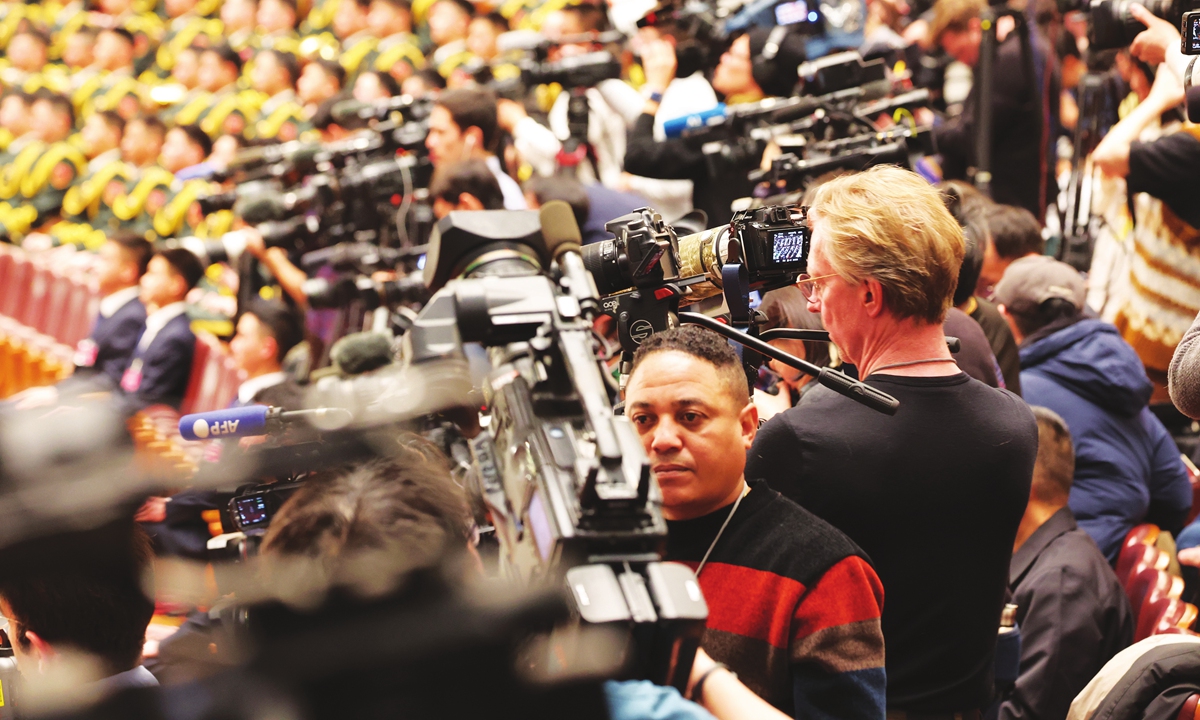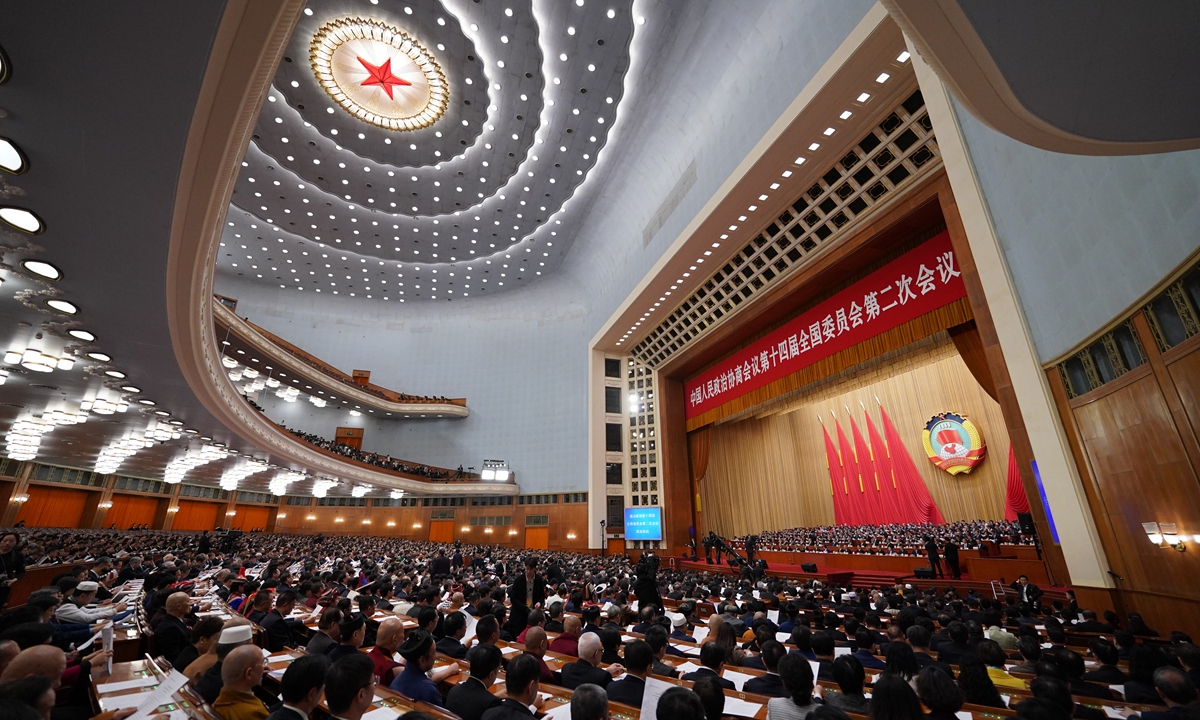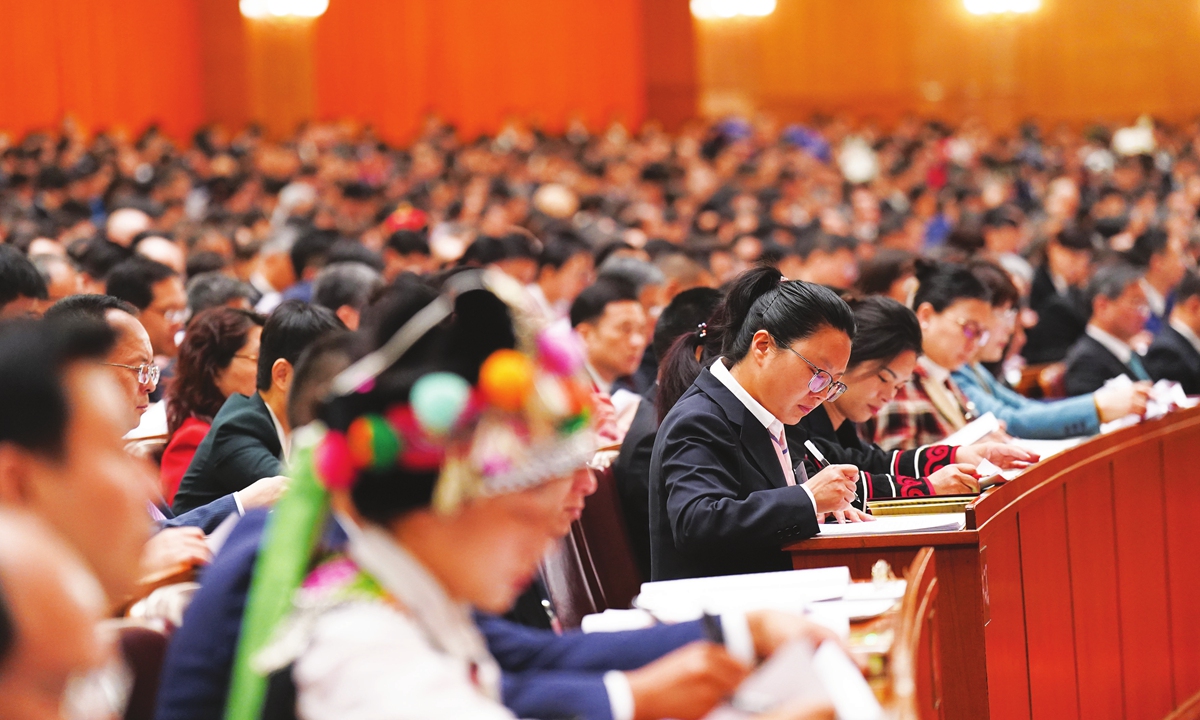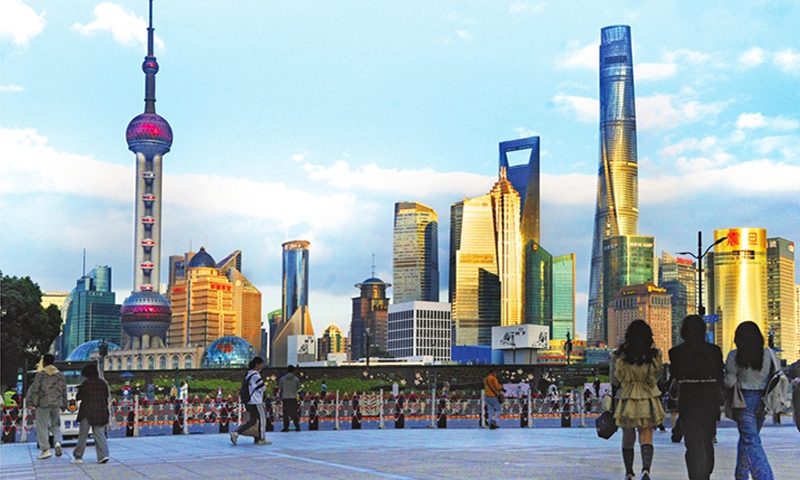
Foreign journalists cover the opening meeting of the second session of the 14th National People's Congress on March 5, 2024, in Beijing. Photo: VCG
Editor's Note:
China's annual two sessions have officially ended on Monday. This critical series of meetings in spring is vital to defining China's approach to economic, political and foreign policy issues for the whole year. It also offers observers a window into the latest ideas and practices of China's development in various aspects, including the whole-process people's democracy, high-quality development, Chinese modernization and the wisdom the country provides to global governance.
In the eighth piece of the series "Two sessions inspirations," Hisham El-Zimaity (El-Zimaity), secretary general of the Egyptian Council for Foreign Affairs and former ambassador of Egypt to Japan, Hungary, Slovenia and Pakistan, shared his insights with Global Times (GT) reporter Li Aixin, saying Egypt and China are both against hegemonic acts and seek inclusive economic globalization because this is the only way the world can go further.
GT: China has been participating in global governance for over 50 years. How would you comment on China's role in global governance in the past? Can you offer an example in this regard that has left a deep impression on you?
El-Zimaity: China and Egypt maintain historical, traditional, strong relations. It's been going deeper since the 1950s. What Egyptians and others appreciate very much is the pacifist and principled diplomacy of China, in the sense that China is a force of moderation, a friendly country that seeks to cooperate with others.
When it comes to global governance, if you're asking me for an example [of China's role], I would mention the mediation between the Kingdom of Saudi Arabia and the Islamic Republic of Iran. This was something unexpected, but very much welcomed and successful. There is hope that China will get more involved in the solving of problems, especially in an area where problems can be found almost everywhere.
China, as a permanent member of the UN Security Council, has a special responsibility in maintaining peace around the world. China is committed to that role and is doing its best in adopting and encouraging peaceful resolution of conflicts, whether they are in the Middle East, Africa, or beyond these two areas.
GT: Based on your understanding, what is China's main approach to its participation in global governance?
El-Zimaity: Egypt and China have always called for an equal and orderly multipolar world and inclusive economic globalization.
These were two options that Egypt, China and other like-minded countries have endorsed. We are against hegemonic acts. We respect the UN Charter, as well as the rules of international law. We oppose the so-called rules-based order - in which a few try to impose their own rules on the majority. Since the majority did not participate in writing or setting these rules, why should we abide by them?
So we respect the UN Charter, which is enshrined in the constitution of all member states and we call for respect of international law.
GT: Your wording is almost the same as Chinese Foreign Minister Wang Yi, who said during the two sessions that China believes in an equal and orderly multipolar world and a universally beneficial and inclusive economic globalization.
El-Zimaity: I've been following the important meetings, speeches and statements as much as I could. I think that we see eye to eye in our view of the world. Egypt and China are both against hegemonic acts and seek inclusive economic globalization, because this is the only way we can go further. And this is very important for China's game-changing initiative, the BRI, as well as for our national economic development plan, which we call Egypt Vision 2030.
China's Foreign Minister emphasized that China was a force of peace, stability and progress. That peace was the most important element for the international community. That development was the golden key to solving humanity's problems. He also stressed that non-interference in the internal affairs of others was key to stability. He added that China seeks political settlements of disputes within a multipolar world. I very much agree with these points. I also salute China's position vis-à-vis the destruction of Gaza which needs to end now. Humanitarian assistance should be allowed in large quantities and negotiations for the two-state solution should begin and be taken seriously. Egypt is neighboring both Israel and Palestine and bringing back stability to our neighborhood is essential for the region and the world. China and Egypt are cooperating in these efforts.
GT: You mentioned we are now in an era where problems are everywhere. At the same time, international mechanisms are failing to cope with the situation. What is the root cause?
El-Zimaity: The root cause is historical. But what I would say is that maintaining stability is the key to development. I admire very much the concept of "new quality productive forces," which was mentioned by President Xi Jinping, with deeper integration of technical and industrial innovation. This is a push in the right direction.
Every country's stability affects neighboring countries and the world at large. Take the terrible example of what is going on in Gaza. These Palestinians living under military occupation for the last 75 years continue to suffer on a daily basis, even to the level of famine. The Palestinians in Gaza are struggling to feed their children. This is terrible, and the situation there is impacting the whole region and beyond the Middle East. The conflict is spilling over. We've seen commercial cargo ships moving around Africa, thus adding 14 days to their route instead of going through the Red Sea and the Suez Canal. In Egypt, we have lost almost half the income we used to receive from the Suez Canal. Everybody is talking about the need for a cease-fire, and for humanitarian assistance to be unfettered without any obstruction by Israel, but five months after the sad story started, it is still going on with no end in sight.
In order to end this disaster, we need to concentrate on development, trade and doing business together. We have a lot to do. We have the concept of win-win cooperation which is beneficial to all of us. We need to start working together to reach that goal.
GT: How does Egypt view China's other initiatives, such as the Global Civilization Initiative?
El-Zimaity: In the cultural and education field, we have a Chinese language department at many universities here in Egypt. We were just celebrating the 20th anniversary of the establishment of the Chinese language faculty at Cairo University. In Egypt, we have thousands of graduates who speak Chinese - about 2,000 graduates each year - and more are coming, because Chinese culture, Chinese civilization and Chinese friendship are extremely important for the youth of Egypt and for the young people who aspire to be part of the Global Civilization Initiative. And in China, many students are learning Arabic and specializing in Arabic culture.
GT: What's your take on the "China threat" theory?
El-Zimaity: This is something I do not believe at all. It makes me laugh when they talk about the "China threat" when they are themselves the threat to the stability of the world. It is not something that should affect our way forward together.
Let me give you an example of the "debt trap." They say there is a trap in every project every time China is financing a project in an African country or an Asian country. We've seen this with the port in Sri Lanka. We've seen this with the train linking Mombasa to Nairobi in Kenya. They forget that the governments of these countries are, I am sorry to say, not stupid. They are intelligent people. No responsible president or prime minister will sign up for something that would be a trap for his own country. One would be naive to think that there is a trap whenever there is a Chinese project for development.
China is not a threat. China is a friend. When the Chinese come, they enter from the big door. They don't come through obscure means. And they are welcomed by everyone. So let us not waste precious time thinking about these terminologies that have no real value.
GT: What do you think is needed the most in the future development of global governance?
El-Zimaity: Global governance is going to go through a very difficult phase in the future. Is the chaos that the world is seeing ever going to end? Nobody knows. How is the situation in Gaza going to develop? Are we going to seriously start negotiating the two-state solution and finally give the Palestinians their rights to live like any other people?
What we need is to stay together and have stronger relations with more investments in every sense - not only financial investments, but also industrial and cultural. We need to enhance investments in the global sense of cooperation so that we are linked to each other. And together we can do something about the future of global governance.
People like to talk about the UN Security Council and the number of its seats: 15, 20 or 25. The negotiations started on this issue in 1993. I was a member of the Egyptian delegation to the UN in New York at that time. Enlarging the Security UN Council, in my humble opinion, is not going to happen soon, because the conditions are not met for an expansion. But what is more important is to improve the way the council performs. It is monopolized by one or two countries. They impose their vetoes whenever they don't like an action to be taken. This is something that we should deal with. It doesn't matter whether the members are 15 or 25 or more than that. But if enlargement happens, then Africa, which suffered a long historical injustice, has to have its rightful place in an enlarged Security Council.
GT: What is your view of the role of the Global South in future global governance?
El-Zimaity: South-South cooperation has been going on for decades and improving with time. This is a way to push forward our cooperation and influence the ongoing events. We are a big group. We should work together to ensure that our voices are heard, and our positions respected. We are not asking for the moon. We are asking for basic rights for every country to develop peacefully without any pressure or interference from the outside world. With time and cooperation and by standing together, we will achieve it.



